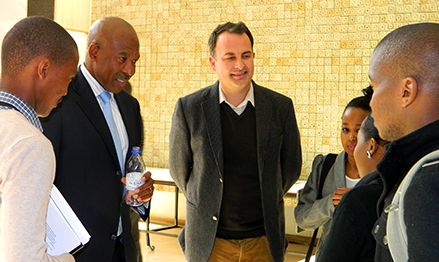Latest News Archive
Please select Category, Year, and then Month to display items
12 January 2024
|
Story Nonsindiswe Qwabe
|
Photo Sonia Small
 Since joining the UFS in 2008, Dr Grey Magaiza has worked extensively on approaches that can foster the socio-economic transformation of societies.
Since joining the UFS in 2008, Dr Grey Magaiza has worked extensively on approaches that can foster the socio-economic transformation of societies.
“The future should be one where communities can decide on their development agenda and futures. That’s the most important for me.” Dr Grey Magaiza, Deputy Director of the Centre for Gender and Africa Studies (CGAS) and Head of the Community Development programme on the Qwaqwa Campus, is passionate about capacitating communities to be agents of change and advancement. His vision for the future emphasises the empowerment of communities to take charge of their development by actively participating in decision making and the implementation of development projects that can improve their lives.
Since joining the UFS in 2008, Dr Magaiza has worked extensively on approaches that can foster the socio-economic transformation of societies. Over the years, he has crafted his research speciality into one that he is most proud of – being an interdisciplinary scientist immersed in the development of communities.
“I’m in a fortunate position of researching what I like. I say ‘fortunate’, because I’ve taken the time to understand what I’m passionate about, which is the overall field of rural livelihoods and livelihood futures – in short, community development. My research starts from an engaged university, understanding the elements that a university must use to enhance transformation and relevance to its immediate community in terms of development.”
One of the ways he has done this is by looking at social entrepreneurship as a development approach for young people in a rural setting. Through workshops with non-profit and civic organisations in Qwaqwa, Dr Magaiza has been helping these organisations to map out their needs and actively meet them through the involvement and support of external role players.
“We understand that communities are part of the national development agenda, but even that national agenda respects community knowledge and intentions and allows communities to shape their identity. A critical enabler of this is community organising. You bring back the capacity in communities to have dialogues on issues affecting them as spaces for engagement, knowledge exchange, and for people to just talk about their way forward.”
By enabling communities to define their development agenda, they can address their specific needs, challenges, and aspirations, he said. “When I look at livelihood futures, it’s quite an exciting aspect of my work – it’s like looking into a fortune tellers’ globe, because you’re not deciding for communities what they should do, but the communities themselves take those decisions.”
UFS101 students learn from the masters
2013-09-01
 |
Letsetja Kganyago (second from the left) and Dr Francois Strydom (on the right, next to him, Director of the Centre for Teaching and Learning, in discussion with third-year students.
Photo: Stefan Lotter
01 September 2013 |
Huge effort is employed to expose first-year students through the UFS101 programme to the largest possible landscapes of South African politicals, economics and other fields. The lecture that Letsetja Kganyago, Deputy Governor of the South African Reserve Bank, delivered in August 2013, was no exception.
About 4 000 students attended the lecture at the Bloemfontein Campus, of which 150 students on the Qwaqwa Campus shared in the proceedings via live streaming. Kganyago discussed the impact of the international financial crisis on South Africa, as well as on the man in the street.
Third-year and postgraduate students also had an opportunity to talk to him during his visit.
The UFS101 programme was bolstered earlier this year through lectures delivered by a judge from the Free State Supreme Court, as well as Prof Jonathan Jansen, Vice-Chancellor and Rector.